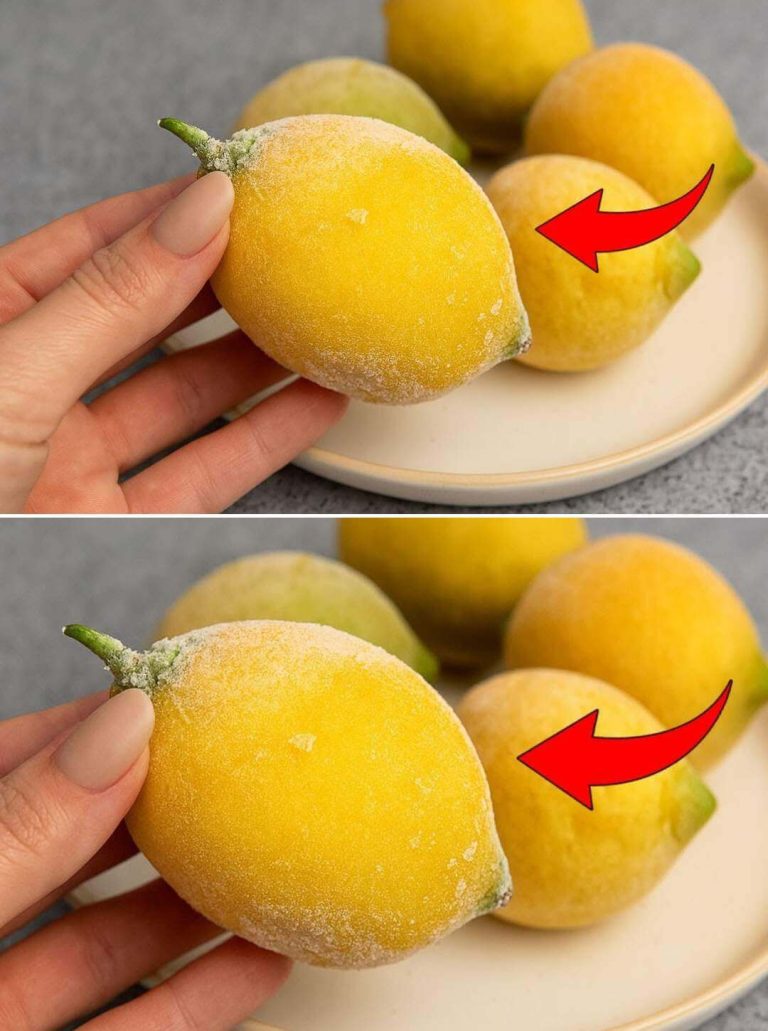Stop throwing away dried-out lemons and discover these game-changing preservation techniques that will keep your citrus fresh, flavorful, and ready to use for months. These practical methods not only save money but also ensure you always have lemons on hand for cooking, drinks, and health remedies. From freezing whole lemons to creating delicious jam from peels, these strategies eliminate waste while maximizing the incredible versatility of this amazing fruit.
Method 1: Freezing Whole Lemons
Ingredients and Supplies:
- Fresh lemons – any quantity
- Hot water – for cleaning
- Freezer bags – zip-lock style
- Kitchen towels – for drying
Instructions:
Clean lemons thoroughly in hot water to remove waxy coating, then rinse and dry completely with kitchen towels. Place dried lemons in freezer bags, removing as much air as possible by submerging the bag partially in water to push out air. Seal tightly and freeze for up to 5 months. Use directly from frozen for zesting, or thaw first for juicing.
Method 2: Refrigerator Storage with Baking Soda
Ingredients and Supplies:
- Fresh lemons – unblemished with shiny skin
- Baking soda – 1 tsp
- Clean water – for soaking
- Paper towels or newspaper – for wrapping
- Plastic container with lid – not completely airtight
Instructions:
Dissolve 1 teaspoon baking soda in clean water and soak lemons for 5 minutes. Rinse thoroughly and dry completely with paper towels. Wrap each lemon individually in paper towels or clean newspaper to absorb moisture. Place in plastic container with loose-fitting lid and store in refrigerator vegetable compartment away from ripening fruits. Keeps fresh for 2-3 weeks.
Method 3: Plastic Wrap Preservation
Ingredients and Supplies:
- Fresh lemons – completely dry
- Salt – 1 tsp
- Clean water – for washing
- Plastic wrap – food grade
- Storage container – for refrigerator
Instructions:
Wash lemons gently in salt water solution (1 tsp salt dissolved in water), then rinse and dry thoroughly. Cut plastic wrap pieces large enough to completely cover each lemon. Wrap each lemon tightly, pressing plastic wrap against the peel to eliminate air pockets. Store wrapped lemons in refrigerator vegetable compartment for 2-3 weeks.
Method 4: Water Immersion Storage
Ingredients and Supplies:
- Fresh lemons – whole, washed, and dried
- Glass jar or plastic container – with tight lid
- Filtered water – enough to submerge lemons
- Refrigerator space – for storage
Instructions:
Place clean, dry lemons in glass jar or plastic container. Pour filtered water over lemons until completely submerged. Cover tightly and refrigerate. Change water every 3-4 days to maintain freshness. Lemons stay fresh and juicy for 2-3 weeks without drying out.
Bonus: Lemon Juice Ice Cubes
Instructions:
Cut lemons in half and squeeze juice into a cup. Pour lemon juice into ice cube trays and freeze. Once frozen, remove cubes and store in freezer bags. Use individual cubes for drinks, cooking, or mix with warm water and honey for a healthy beverage.
Bonus: Lemon Peel Jam Recipe
Ingredients:
- Frozen lemon peels – from juiced lemons
- Filtered water – 500ml / 2 cups
- Granulated sugar – equal weight to prepared peels
Instructions:
Thaw frozen lemon peels by soaking in water for 5 minutes. Slice and chop finely. Boil peels in 500ml water for 10 minutes, then drain and replace with fresh water. Soak overnight. The next day, drain peels and combine with equal weight of sugar in a pot. Simmer for 1 hour until thick and jam-like. Use on bread, cakes, ice cream, or with cheese.
Storage Guidelines
- Frozen whole lemons: 5 months
- Refrigerated wrapped lemons: 2-3 weeks
- Water-stored lemons: 2-3 weeks with regular water changes
- Lemon juice cubes: 6 months frozen
Why These Methods Are Beneficial
These preservation techniques maximize the nutritional value and versatility of lemons while minimizing food waste. Lemons provide vitamin C, citric acid, and beneficial plant compounds that support immune function and digestion. By preserving lemons properly, you ensure access to these health benefits year-round while reducing grocery costs and environmental impact. The methods use simple, non-toxic materials and avoid chemical preservatives, making them safe for family use. Having preserved lemons readily available encourages their regular use in cooking and beverages, supporting healthy hydration and adding natural flavor without artificial additives.
